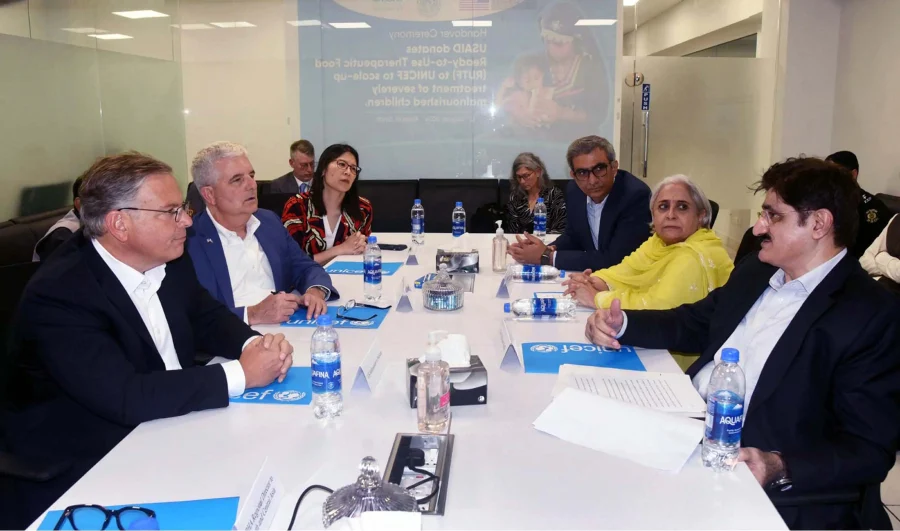Sindh Chief Minister Syed Murad Ali Shah has announced a renewed commitment to tackling malnutrition and stunting in the province, bolstered by significant backing from UNICEF and USAID. Speaking at a ceremony held on Monday at the UNICEF Warehouse in Port Qasim, Shah highlighted the importance of this support in addressing these pressing issues.
The event, marking the transfer of Ready-to-Use Therapeutic Food (RUTF) from the US Ambassador Donald Bloome to UNICEF, was attended by notable figures including Health Minister Dr. AzraFazalPechuho, BHA Regional Director for South and Central Asia IvanaVuco, US Consul General in Karachi Conrad Tribble, USAID Mission Director Kate Somvongsiri, UNICEF Representative Abdullah Fadil, and Secretary Health RehanBaloch.
Chief Minister Shah recognized the crucial role of international partners in overcoming the challenges exacerbated by the catastrophic floods of 2022. Murad Shah said that UNICEF has been instrumental in supporting the review and approval of the Breastfeeding Act, enhancing humanitarian and multisectoral coordination, and providing vital nutrition services in hard-to-reach areas.
“Through outreach teams, UNICEF has facilitated the early detection and treatment of wasting (severe malnutrition) and addressed micronutrient deficiencies.,” he said. He added that UNICEF has provided Ready-to-Use Therapeutic Food (RUTF) to the People’s Primary Healthcare Initiative (PPHI) and other civil society partners, significantly contributing to the fight against malnutrition in Sindh. The chief minister also acknowledged USAID’s extensive support, particularly its provision of financial assistance to UNICEF for integrated health, nutrition, water, sanitation, and hygiene (WASH), and protection services.
It may be noted that USAID supplied 98,500 cartons of RUTF worth $4.4 million or Rs12.2 billion for malnourished children in Sindh. The CM expressed gratitude to USAID and UNICEF for their continued partnership, which has been pivotal in addressing the health and nutrition needs of women and children in the province. He reiterated his commitment to tackling malnutrition through multisectoral initiatives, community engagement, and social protection programs, supported by substantial financial allocations in its annual development program. Murad Shah praised UNICEF as a strategic partner across various sectors, including health, WASH, child protection, and education.
He emphasized the importance of ongoing collaboration to overcome the multiple challenges facing the province. Health Minister DrAzraFazal also recognized, particularly in advancing the province’s nutrition agenda through the enactment of the Breastfeeding (BMS) Act and the allocation of public funds for RUTF and Multiple Micronutrient Supplements (MMS). She added that the Sindh government has expanded nutrition services for malnourished children to all districts, underlining its dedication to integrating these services within the primary healthcare system.
The UNICEF representative, Abdullah Fadil, stated that the Infant and Young Child Feeding (IYCF) practices in Sindh are suboptimal. The rates of early initiation and exclusive breastfeeding are only 48% and 52.3%, respectively. Minimum dietary diversity and minimum acceptable diets for children aged 6-23 months are a mere 12.6% and 2.2%, indicating that over 98% of children in this age group in Sindh are not adequately nourished. During the ceremony, the Sindh government’s key accomplishments were acknowledged.
These included the Sindh Protection and Promotion of Breastfeeding and Young Child Nutrition Act of 2023, the allocation of Rs 5.9 billion for Multisectoral Nutrition Interventions for 2024-2025, the establishment of a Multisectoral Coordination platform for Early Childhood Development (ECD) and nutrition, the launch of the Benazir Nashonuma Program, nutrition initiatives in 111 FCs and 35 mobile FCs, and the transition from Iron Folic Acid to Multiple Micronutrient Supplementation for Pregnant Women.
The event concluded with a reaffirmation of the Sindh Government’s commitment to collaborating with international partners to achieve a healthier and more prosperous future for its citizens.










